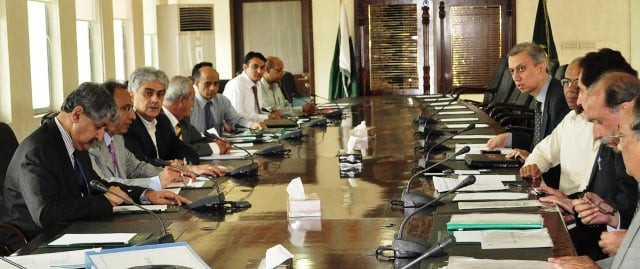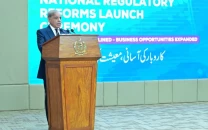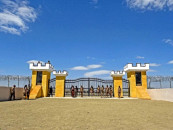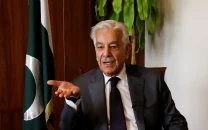Energy committee meets: Circular debt resolution linked to power sector reforms
IPPs to make presentation before the panel today.

A cabinet panel looking into ways to resolve the burgeoning energy crisis has linked the resolution of circular debt with the government’s ability to push ahead with power sector reforms, which were previously left halfway under political pressure.
For the second consecutive day on Wednesday, the cabinet committee on energy crisis held in-depth deliberations on the current state of power sector, especially the financial aspect including the circular debt. The committee discussed various options to mitigate the financial crunch and decided to further analyse these options.
On Thursday, the committee will listen to the views of independent power producers, who are claiming Rs210 billion in outstanding dues and threatening to suspend 7,750 megawatts of power generation, which can push the country into darkness.
The meeting was held under the chairmanship of Finance Minister Dr Abdul Hafeez Shaikh and attended by ministers of water and power, petroleum and natural resources and Planning Commission deputy chairman.
“We are still in the mode of putting things in perspective as still a lot needs to be done before taking a set of recommendations to the cabinet for a decision,” said Finance Secretary Dr Waqar Masood.
A finance ministry official said the government has bailed out the power sector five times without clearing the debt stock and it would not do so for the sixth time without knowing the exact size of the stock.
The meeting was aimed at coming closer to inter-corporate debt figure and the amount required to address what the finance minister called “a symptom and not the root cause of the crisis.”
The committee also deliberated on power tariff rationalisation and bringing Karachi Electric Supply Company (KESC) into the basket of other power distribution companies. A key member of the committee said the panel came very close to the circular debt figure.
Pakistan Electric Power Company (Pepco) demanded that the government should either pay or help to recover its dues from consumers. It said Sindh owed Rs39 billion, KESC Rs40 billion, Khyber-Pakhtunkhwa Rs18 billion, Punjab Rs10 billion and Fata Rs12 billion.
Pepco representatives assured the committee that if it received the dues it would clear the outstanding amount of IPPs.
“If the government is ready to bring improvement in management, then the debt will come down by Rs70-80 billion,” the committee member said requesting anonymity.
He said power tariff adjustments would result in a further reduction of at least Rs80 billion and collection of bills from inaccessible areas of Balochistan and Khyber-Pakhtunkhwa would sharply reduce the number.
Another member said “the circular debt number is too big if the government does not dare to introduce reforms.”
Last year, the government had started increasing power tariff by two per cent a month and made some progress on improving line losses but abandoned the initiative after coming under pressure of vested interests, who allegedly were making billions of rupees by stealing electricity and fuel and overcharging the consumers.
The committee decided to engage with all stakeholders including IPPs, board of directors and management of power distribution and generation companies, KESC and private sector representatives.
Published in The Express Tribune, August 11th, 2011.


















COMMENTS
Comments are moderated and generally will be posted if they are on-topic and not abusive.
For more information, please see our Comments FAQ